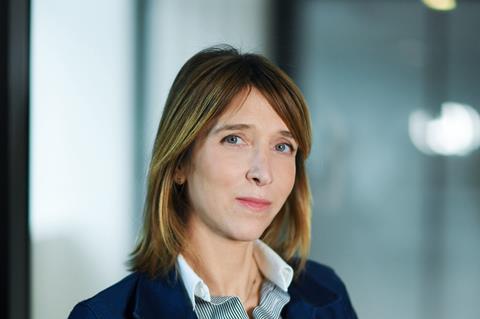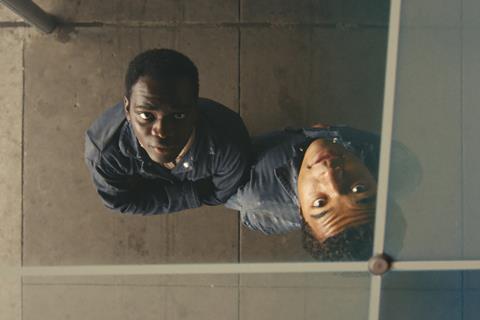
France’s Mediawan Group has established itself as a European-based production-focused powerhouse with an increasingly global reach. The company now encompasses more than 85 film and TV production labels in 14 countries, including the US’ Plan B, UK-Australian outfit See-Saw Films and Germany’s Leonine Studios.
With international backers including KKR, Société Générale, BPI, MACSF, The Raine Group and Atwater Capital, Mediawan companies produced 480 hours of on-air drama in 2024 and had 25 films in cinemas.
The latter included two of the top five films of the year at the French box office: The Count Of Monte-Cristo from Chapter 2 and Beating Hearts from Hugo Selignac’s prolific French production house Chi-Fou-Mi; Mediawan’s majority stake in Plan B yielded features including Venice opening film Beetlejuice Beetlejuice and awards contender Nickel Boys.
Upcoming 2025 films include Cedric Jimenez’s sci-fi feature Chien 51 and Quentin Dupieux’s L’Accident Du Piano, both from Chi-Fou-Mi, while Plan B is revving up to drive Joseph Kosinski’s anticipated F1, starring that company’s co-founder Brad Pitt, into global cinemas.

Further down the line is See Saw’s planned film franchise of The Neverending Story, and the long-anticipated Call My Agent! film from France’s Mon Voisin Productions.
On the TV side, Adolescence has been a word-of-mouth sensation from Plan B for Netflix, while Mediawan’s Series Mania’s slate included French series Kabul in competition, produced by 24 25 Productions, and Sally Wainwright’s Riot Women from its UK outfit Drama Republic, on which it launched international sales.
Through Plan B, it is now developing a drama series version of the book on which online dating swindler documentary The Man With A Thousand Faces was based.
The group recently partnered with Paris-based investment firm Entourage Ventures on a €100m fund to develop television content.
Paris-based Elisabeth d’Arvieu, CEO of the film and TV division Mediawan Pictures, who works closely with co-founder and CEO Pierre-Antoine Capton, talks to Screen about leveraging the company’s global reach and talent relationships, moving further into film production and the English-language market, and why she believes it is a good time to be a European company.
How does Mediawan work with its network of global producers?
We are here to support them in their international development and ambitions by offering co-productions with Mediawan’s producers and assisting them in worldwide distribution.
Kabul is a good example of Mediawan’s strategy to work with major European talent, finance their projects and sell them globally. 24 25 Films joined us in 2023 as film producers but they had been wanting to develop a series on an international scale for a long time and to expand into new creative territories.
They came to us with this ambitious story written by two famous French screenwriters, Olivier Demangel and Thomas Finkielkraut. Thanks to the support of the group, we assisted them in the development of the project and in securing the financing. The Alliance [France Televisions, ZDF and Rai] was onboard from a very early stage and Mediawan Rights and Entourage Ventures, who are selling it internationally, boarded for gap financing and allowed us to accelerate the process.
What has driven the acquisition of See-Saw Films and your M&A activity over the past years with Plan B, Drama Republic, Misfits, Leonine Studios and more?
Both artistically and strategically, many things matched with See-Saw. They have an artistic vision that is completely in line with ours, namely always wanting to work with top talent on premium projects. We were talking to them for a long time and over the years they have worked with many talents in the Mediawan family like Florian Zeller with The Son [Mediawan backs Zeller’s Blue Morning Pictures] and with Plan B on David Michôd’s The King and now on Michod’s next film Wizards!
Their strategic vision of the market is also consistent with ours. The company doesn’t just rely on its two founders, but they’ve developed a team of independent producers who each have their own lineups allowing them to diversify in different genres. They started with cinema and have become leading series producers.
In our territories, we are also aiming to be multi-genre. In the UK, we were strong in scripted fiction via Drama Republic. Now, [through the acquisition of See Saw] we can reinforce our commitment to premium series and movies in the English language and also have the capacity for development and production in the UK and Australia and potential for co-productions with our US and European affiliates. Plus, like us, they are always thinking about ways to leverage IP like The Neverending Story that is gearing up to be a major international franchise.
Are you looking to expand further into the English-language market?
The English-language market is key because it helps the sales and therefore the exposure on the international market. Kabul was made in both the local language of Dari and in English – it was a choice to give it a chance to resonate internationally.
The UK is a very attractive territory because there is immense writing talent and that’s what series are based on. There is an extraordinary talent pool [in the UK] and… it is a territory ripe for co-productions, we see it as a natural link between the US market and Europe.
How has KKR’s backing enabled Mediawan’s expansion?
KKR has been a partner for five years and is one among our important partners in addition to Atwater Capital, Raine, Société Générale, BPI, and MACSF. They support our investments in talent and European projects and they are ready to invest in the long term.
What is the ratio of emphasis on films vs series?
Originally, we were more invested in scripted. Cinema is a more recent development, but it has really exploded at Mediawan over the past three years. Mediawan films had a 15% market share at the French box office in 2024, that means that one person in every six bought a ticket for a film produced by Mediawan last year and we made more than $900m in box office worldwide.
In three years, even though our production lineup is still mostly scripted, cinema has a major role that has been accelerated by the enormous success of our producers.
How is Mediawan navigating such a fast-moving industry given the long lead times on scripted productions and the shifting requirements of the US streamers?
Streamers have rapidly become a key partner. Today, our series lineup is 50-50 between streamers and broadcasters. As for long lead times, the key to their trust is that in each country, we can bring both networks and platforms the best talents they want to work with, from producers to screenwriters and directors. This reassures them and helps them to make decisions more easily and greenlight projects more quickly.
We also bring them strong brands and IPs that can accelerate decision-making and development time like Call My Agent!, created in France by Mediawan’s Mon Voisin Productions, and now adapted in more than 12 countries, One Day written by David Nicholls and produced by Drama Republic, Family Pack produced by Radar Films for Netflix which is an adaptation of a successful European board game, and the upcoming film Chien 51, produced by Chi-Fou-Mi, an adaptation of Laurent Gaudé’s French best-seller.
Another key element to expediting the development process is that as a European studio, we can accompany our producers in financing their projects internally and independently, so we come to both streamers and broadcasters with packages already in advanced stages.
Can you give a recent example?
The story behind the upcoming [film] adaptation of Fresh Water For Flowers, based on Valerie Perrin’s worldwide bestseller, illustrates this strategy. [Mediawan-owned Italian outfit] Palomar wanted to adapt the book for a while. It is a huge success in Italy with more than 1 million copies sold. But the author preferred to be faithful to the story and shoot in Burgundy. To make this possible, we built a coproduction between Palomar and our French company 24 25 Films with Jean-Pierre Jeunet attached to the project as director and Leila Bekhti starring. Then we came to the market with a project that was already pre-developed.
Who do you see as your competition? Are you looking to compete with the likes of Banijay and Federation?
I don’t want to compare Mediawan to anyone else. We’re doing something that is unique, that is the model that we have created and the fact we can assemble all of our diverse talents from different countries under one group. None of our companies and partners have ever left the group - they have all stayed on since our creation.
We have respect for the creativity and independence of our producers and we bring them all the advantages of being in a big group, that is to accelerate development and to have access to more ambitious projects and partners across the globe. They discuss projects and co-produce with each other while remaining completely independent in terms of creative choices.
Where do you see Mediawan’s growth coming from in the next five years?

It will come from our talent and in particular the development of our group IPs and franchises. For example, [we have] new seasons or global adaptations of our big shows Call My Agent! and HIP. We just finished a Spanish version of Call My Agent!, we are working on one in Mexico co-produced with Eva Longoria; we’ll make a feature film in French.
We are expanding [the IP of] animated Netflix hit Miraculous: Tales Of Ladybug And Cat Noir, and See-Saw is busy working on The Neverending Story. Fresh Water For Flowers will be a major film in 2026.
Plan B is developing a line-up of series filmed in Europe. They acquired the [drama series] rights to The Man With A Thousand Faces [a book about a serial dating scammer with myriad partners that was made into a documentary of the same name] and will launch a series with Call My Agent! showrunner Fanny Herrero. There was a major bidding war, but because it is Plan B and they had confidence in their vision of the project, and packaged it with Herrero, it is moving forward.
Are you still optimistic about the state of the industry?
The market is tough - we can’t deny it. The television industry, particularly in the US, is complicated. Four years ago, after Covid, cinema was struggling, but in France, 2024 was a strong year at the box office. I am optimistic because we are lucky to be European and to have a market where co-productions are encouraged and where talents are protected.
I’m remaining optimistic because for me, the climate is ripe for the perfect storm of such European creation. We are also lucky to be able to work with exceptional talents. We had eight films in selection at Cannes last year. Look at Riot Women at Series Mania. Sally Wainwright is one of the UK’s biggest talents and combined with Drama Republic and the BBC, it is a premium package that Mediawan Rights in collaboration with Entourage Ventures are bringing to international audiences.
It is another example of the power of Mediawan’s ecosystem as is the current success of Adolescence on Netflix both among critics and audiences. The market is complicated, but our positioning both creatively and financially allows us to stay optimistic.
I am not blindly optimistic, but I am consciously and confidently optimistic that we are seeing and will continue to see the fruits of our labour based on the strategy we’ve been constructing for years.







![The Brightest SunScreen[Courtesy HKIFF]](https://d1nslcd7m2225b.cloudfront.net/Pictures/274x183/3/5/0/1448350_thebrightestsunscreencourtesyhkiff_312678.jpg)

















No comments yet